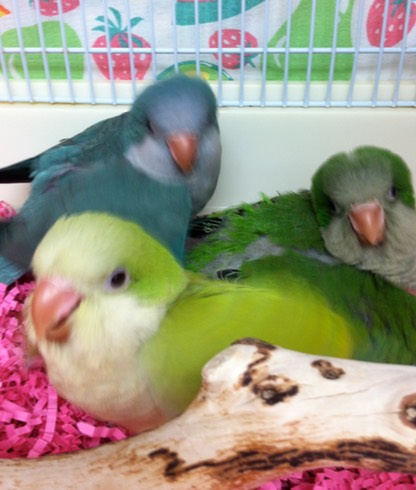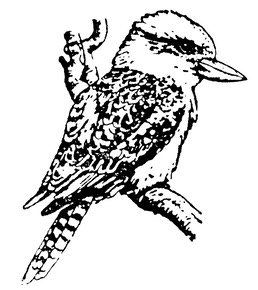
Tickles was a morbidly obese Quaker Parrot who came to us with a recommendation from Dr. Anna Osofsky to have him converted to a better diet for extreme health reasons. I say “was” morbidly obese because Tickles is no longer morbidly obese and on a much healthier diet. This is a true success story!
Kookaburra Bird Shop has a 100% success rate for diet conversions, but I thought Tickles may be the bird to change those statistics. He was definitely a challenge due to his obesity and bad test results. His triglycerides were 10x’s normal and his blood plasma was all lipids. You would think he would have been on death’s door with those test results, but other than being really fat he acted like a normal quaker parrot and his feathers look normal. He proves once again that annual test results from a proper veterinarian are really important to your bird’s health and well being.
That is some background information on this case just so you understand why diet is so important to pet birds. Variety is the key to all pet bird’s health, but what exactly does that mean? How do you make sure that your pet bird is getting that variety. There are several methods that work and I don’t believe there is 1 right answer, but I do have methods that have worked for me and my clients over the years so that was what we were using with Tickles.
In the past we called the process “pellet conversion” and you may see that on some of our old literature. I have since changed it to “diet conversion” because this is more of a complete name for what we are doing. The end result is a bird that is consuming 40-60% pellets, 10-20% cooked or fresh foods, & 5-15% quality seed mixes. We have ranges depending on season and sometimes we know that life can get in the way of perfection.
Those of you who have purchased your bird from Kookaburra Bird Shop were given a list of instructions that when followed results in these ranges. We send you home with birds already on a very good diet and truly believe it is the best that you can do for your pet bird. If you haven’t revisited your take home instructions in a while, now is a good time for you to find yours and go over them. Feel free to ask us when you are in the shop and we can give you a new sheet if needed.
I digress, so back to Tickles and his diet conversion story. First off I want to make it clear, that his parents were not bad parents. Tickles had trained them into feeding him a high fat mostly sun flower seed diet even though they were offering him other items. He was a classic case of having an abundance of variety to eat, but only eating what he wanted because plenty was being given to him. This is the main problem with seed diets. If your birds ate everything in the bag of seeds, he would actually be on a fairly decent diet. The problem with this presentation it that they don’t do that. Most people feed way to much and the bird then throws out what it doesn’t like and ends up only eating one or two items in the entire bag. Bags of seeds are not some evil that must be avoided, but rather something that needs to be closely monitored. Most people do not have the time or patience for this and a pellet diet is much easier for them to monitor.
Tickles wasn’t eating any pellet foods, fruits, veggies, or cooked diets. Our goal on diet conversion is to get him eating mostly pellets and fruits & veggies. Some seed could be added later. Because of his health issues, it was very important that he didn’t lose to much weight to fast or he could end up with kidney or liver problems.
Diet conversion at Kookaburra Bird Shop last from 10 to 14 days and consists of weigh ins and close monitoring. We don’t like them to lose more than 10% of their body weight and want them stabilized before they go home. We have the advantage that your bird will be watching all our birds eat which is one of the main reasons our success rate is so high. This is where Tickles’s unique situation posed a new challenge for us.
Tickles weighed 156 grams when he arrived at Kookaburra Bird Shop. Normal weight range for Quaker Parrots is between 80-120 grams. We were not able to feel his breast bone. The normal procedure is to weigh them in and then start with feeding exclusively pellets. We use a mix of several different brands and check the bird several times daily to see how he is doing. At his first nightly weigh in he had clearly not eaten any pellets and was down to 153 grams. This was all very normal. It is not unusual for the first 24 hours that the bird does not eat anything at all.
Day 2 is when things became a little more of a concern. Tickles had not eaten and was down to 148 grams. His behavior was normal and he was active and talking we weighed him again at night and he was down to 146. Since this was more than we like to see we gave him a little seed mix and moved him next to a piggy conure who was staying with us. We rearranged his bowl and noticed he like one of the brands of pellets more than the others, so added more of those to his bowl. He started eating the pellets, but was still losing weight. From days 3-7 he was eating pellets, but steadily losing weight. Which was a concern because under normal circumstances birds stop losing weight at this point.
He still felt chunky, was still talking and acting happy, just continuing to lose weight. In every other diet conversion I have performed over the years, the birds start eating and their weight stabilizes once that has started. Tickles was so obese that the good diet was causing him to reach his normal weight more quickly that we liked. Upon consultation with Dr. Osofsky, we decided that Tickles could have 1 nutriberry with his pellets to help slow down his weight loss. This helped stabilize the weight loss and Tickles then weighed in 126 grams for several days. We accepted the 20% weight loss because Tickles had been so fat. After 14 days, Tickles was another successful diet conversion and I expect Tickles will eventually stabilize around 100-110 grams, which is a normal quaker weight range.
His owners have taken him home and are weighing him twice a day. They have been given instructions and so far Tickles is doing very well. I am crossing my fingers that the diet helps his next vet check up and his tests are in normal ranges.
Generally birds take 7-10 days to convert. This was my first truly obese bird to convert to a better diet. The lessons learned here were many. Sometimes you need to err on the side of caution so they do not have other health problems associated with dropping weight to quickly.
Diet conversion can be done at home but is much more difficult. You don’t have the advantage of all the other birds eating the diet you would like your bird to be on. We are here 10 hours a day and can monitor everything that is going on with your bird. If we need to weigh several times a day to verify they are eating, we can do it. It is our job and the birds in our care are our primary focus. We have access to all kinds of bird food which makes it easy for us to switch if one isn’t working for your bird. When it’s all said and done we will send you home with the foods that worked for you bird. I hope to keep my 100% success rate, but I am a realist and someday there will be a parrot that will be more stubborn than I am! I am happy to say for Tickles he was not that bird.



